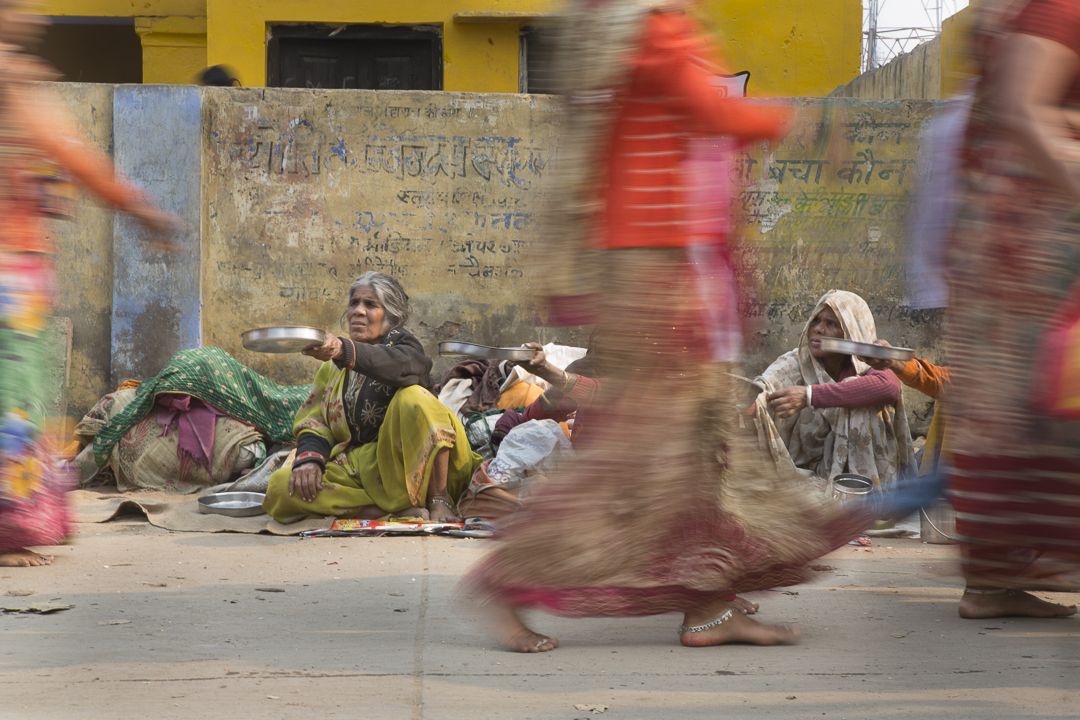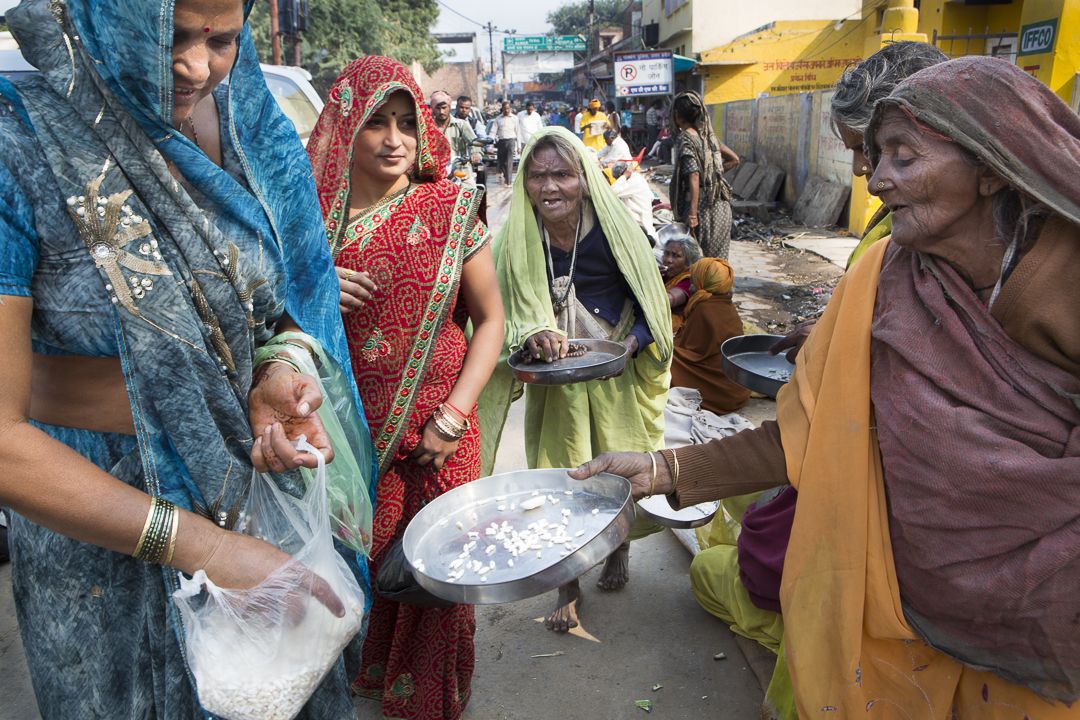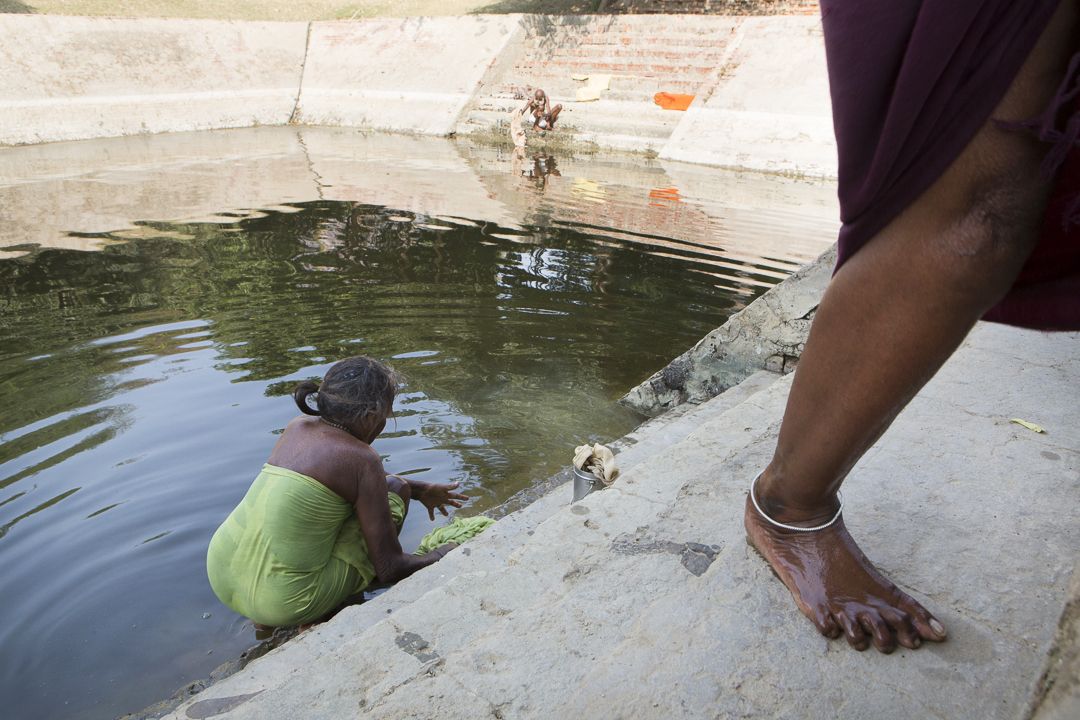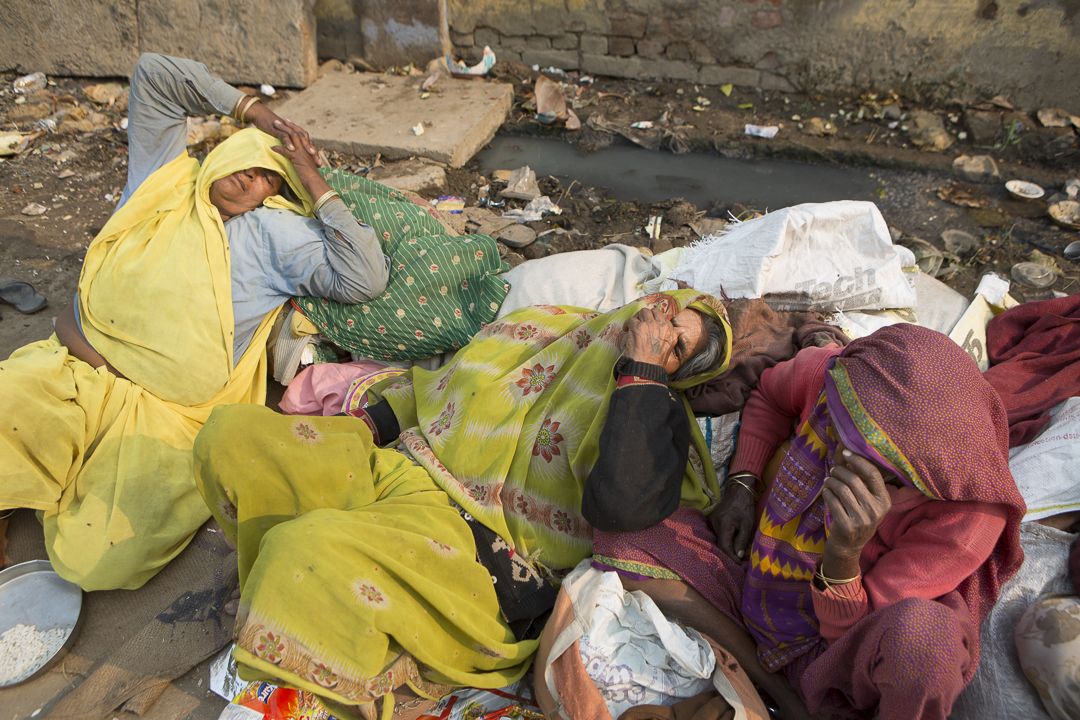In the Mahabharata, young Krishna—the human incarnation of the protector god Vishnu—sheltered the town of Govardhan from catastrophic downpours by lifting a mountain on his little finger like an umbrella over its huddled inhabitants. Pilgrims from all over India travel to that mountain, the Govardhan Hill, to complete a parikrama, a 21km circumnavigation of the hill walking barefoot or prostrating themselves fully on the ground, moving one body length at a time along the dirt road.
I arrive at the beginning of the parikrama with photographer Amy Toensing and our translator, Indian journalist Suman Parmar, on a cool morning in November. Pilgrims, cars, rickshaws, tractors, dogs, and monkeys ebb and flow along the route, edged on either side by canals clogged with the trash and sewage of tens of thousands of tourists.
Many Hindus complete their prayers with the gift of alms to the poor, and strung along the parikrama route are clusters of elderly women and men, tin pans held out to passersby who distribute dry toast, puffed rice, powdered milk, and sometimes a little bit of money. A young girl walks along the line of beggars, dropping coins in the first few pans until she has no more, then she sprints past a small group of women sitting on burlap and plastic bags at the feet of the pilgrims, their few possessions in lumpy sacks next to them. Just behind them, the fetid canal overflows with wet muck and drifts of garbage from the tourists on whose charity they survive.
The women are widows, and friends: Puniya, Kalawati, Pachaniya, Urmila, Dulari, a few others sometimes rotate through their cast. They live here on this street, surrounded by filth, for the two weeks of the waxing moon each month, an auspicious time when pilgrims flock to Govardhan. When the moon begins to wane, the group boards a bus together for the ten hour ride back to their home village of Chitrakut, where their earnings support them for the rest of the month in the small temple—there they will live out the remainder of their lives.
When describing the conditions of thousands of widows living throughout the Braj—an area of Uttar Pradesh where the Lord Krishna spent his youth—Indian media and NGO reports use words like “pitiable,” “pathetic,” “deplorable,” “wretched,” “unhygienic,” “inhumane,” and “humiliating.” While reporting in the Braj towns of Vrindavan, Govardhan, and Radhakund, we witnessed many instances of widows living in circumstances that could inspire the use of those adjectives, but what we found ourselves marveling at over and over was the resilience of the girls and women we met and their ability to normalize even the most awful conditions, to find friendship and humor and loyalty after having been discarded by their families.
The group of widows from Chitrakut are older, 50 and up. They left their natal families upon marriage, and following the deaths of their husbands, their in-laws no longer had use for them. They all have children, but none who support them. “It’s not like before, children now aren’t yours,” Dulari Devi tells me, as we perch on a cement wall encircling a tree, wedged next to a truck in a dusty parking lot just off the parikrama. We are surrounded by a crowd of 20 men, eager for any distraction from the normal day’s activities and curious what I’m doing there and why I’m talking to the beggars. A few small boys prod each other to move closer to me until they’re peering into my notebook as I write.
Dulari is “educated,” by the standards of her peers, having completed the 8th grade, and she can read a little, unlike her friends. Her husband died ten years ago, and she picked up what work she could as a day laborer carrying sacks of cement at construction sites to support her three sons until her body could no longer bear it. She described her youngest son, who is now around 20 years old, as “mentally challenged” and unable to work, but she has to leave him at home to come here to Govardhan or else they will starve. Her other two sons are off on their own, but neither sends money to help her or their brother.
“But we’re like family here,” she says. “We travel together, we live together here, we sit and talk together.” I ask her what they talk about all day. “We talk about the people who walk by,” she says, “and we’ll talk about you once you leave!” At this, our audience begins to laugh. “No one ever comes to talk to us,” Dulari says, placing one warm, dry hand on my cheek, the other on my wrist. “Will you come back to see us again?”
Our presence is a rare break in the monotony of their days. They wake around 4 a.m. after a few hours of restless sleep as cars roll a foot from their heads. They sit for a few hours, then take turns going in pairs to bathe when the sun warms. Puniya and Kalawati take us with them to the pool where they bathe, further down the parikrama at the base of Govardhan Hill. Puniya has an impish grin that reveals a few remaining teeth. Unruly locks from her wispy gray ponytail wave around her face. She stands not much more than four and a half feet high, and her spine is warped by scoliosis. She wears several yards of sun-bleached green cloth wrapped over a faded once-yellow sari blouse and a string of 108 wooden prayer beads around her neck that she uses to count out cycles of prayers to Lord Krishna, who married 16,000 widows to protect them from scorn and abuse.
Barefoot, Puniya leads us down the busy road, seemingly oblivious to the blaring horns of cars and auto-rickshaws passing a hair’s breadth from her tiny frame. Amy, Suman, and I instinctively try to herd her toward the edge of the road, putting our bodies further into traffic than hers, though she would never have survived this long if she really needed our help.
She moves at as brisk a pace as her limp will allow. “My leg is hurt, my back is hurt, no one will care for me now,” she says, without betraying any bitterness. She was married at the age of 5 or 6 and her husband lived for about 40 years after their wedding. She has been widowed for around 30 years. She has two adult sons, but they cannot, or choose not to, support her. Like 50 percent of India’s female population, she is illiterate. With unskilled day labor no longer a possibility for her deteriorating body, begging is her only option, one she says she doesn’t mind. She long ago stopped caring what other people say to her, though one of the benefits of living so far from Govardhan is that no one here recognizes her. No one, that is, except the others begging on the parikrama, but they have all become friendly, and good-natured arguments break out as we walk and another widow, sitting next to a fruit vendor, teasingly reaches out to grab at Puniya’s tin pail.
We reach the bathing pool, surrounded by barbed wire. It could be beautiful, sunk into the ground surrounded by trees and grazing cows, stairs leading down on each side. But I can see Amy’s eyes widen as she looks from the pool back to me. There is a raft of brown sludge in one corner and the stench is powerful. Puniya and Kalawati excuse themselves for a few minutes to attend to other needs across the street, and they ask us to wait here for them, not to leave before they come back for their bath. We assure them that we’re not going anywhere without them. As they leave, they duck down and try to touch our feet, a sign of respect usually reserved for elders, and we leap back protesting and laughingly try to touch theirs as they fend us off. “Mērī bēṭiyāṁ,” Puniya calls us, “my daughters.” She presses our forearms in her hands, “Tuma aba mērī bēṭiyām̐ haiṁ,” she says, “You are my daughters now.”







